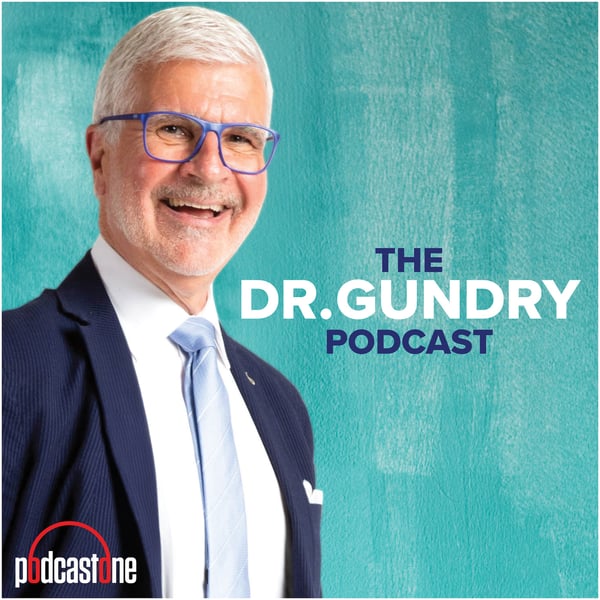For a sharper brain: fries and chocolate? | Ep198
The Dr. Gundry Podcast
PodcastOne
4.6 • 1.7K Ratings
🗓️ 29 March 2022
⏱️ 54 minutes
🧾️ Download transcript
Summary
Transcript
Click on a timestamp to play from that location
| 0:00.0 | Welcome to the Dr. Gundry Podcast. The weekly podcast where Dr. G gives you the tools you need to boost your health and live your healthiest life. |
| 0:13.0 | Welcome to the Dr. Gundry Podcast. Did you know that every 67 seconds someone in America develops Alzheimer's? |
| 0:22.0 | But imagine if there is a way to beat the statistics while reducing the risk of other major health ailments. |
| 0:29.0 | Well, my guest today says there is a solution and it's sitting right in your fridge. |
| 0:35.0 | New York Times bestselling author Max Lucavere says there's a link between the food you consume and your brain health. |
| 0:43.0 | Today Max will be sharing revelations from his latest really cool book, Genius Kitchen, where you can find the secret to stocking your fridge to boost brain health. |
| 0:56.0 | So stay tuned. |
| 0:58.0 | Max and I will dive right into how you can achieve peak mental performance by eating like a genius. We'll be right back. |
| 1:09.0 | Max, welcome to the Dr. Gundry Podcast. Great to see you again, my friend. |
| 1:14.0 | Great to see you. This is becoming a regular occurrence. I'm very, very excited about it. |
| 1:18.0 | So speaking of a regular occurrence, this is your third book and tell us how to eat like a genius. What the heck are genius foods? |
| 1:34.0 | That's a great starting point. Genius foods are foods that are going to give your brain the biggest, the most bang for the buck in terms of shielding it against cognitive decline, helping it work better in the here and now with regard to your executive function, with regard to your brain's processing speed, and also with regard to your mental health, which is a function of good brain health. |
| 1:58.0 | And I got into this when a couple of years ago, my mother showed initial signs of what would ultimately be diagnosed as a rare form of dementia called Louis Body Dementia, which is akin to having both Parkinson's disease and Alzheimer's disease at the same time. |
| 2:12.0 | I didn't have a medical background, but I was a journalist, and at that point, I became solely focused on investigating why this would have happened to a woman at the age of did. |
| 2:23.0 | My mom was 58, she was very young when she first started to show these symptoms. And what I've learned is that dementia often, like many chronic non communicable conditions, begins decades before the presentation of said symptoms. |
| 2:40.0 | By the time you show up to your neurologist, for example, with Parkinson's disease, which is a very common movement disorder, half of the neurons in the substantial nigra, the dopamine producing neurons involved in movement in the region of the brain affected by Parkinson's disease have already perished. |
| 2:56.0 | Alzheimer's disease is another example. Research shows that by the third decade of life, people who are genetically at risk for developing Alzheimer's disease already have begun to show signs in the brain that are associated with Alzheimer's disease. |
| 3:09.0 | So for me, I became very passionate about the notion of prevention, dementia prevention, and I just went down the rabbit hole to learn everything that I possibly could about the condition. |
| 3:21.0 | And as I would, the more I would read, certain foods started to stand out to me, foods that were, that are, for example, staples in the Mediterranean dietary pattern, like extra virgin olive oil, like dark leafy greens, |
| 3:38.0 | like grass-fed beef, like wild fatty fish. And I started to see that people who eat these foods more regularly on a consistent basis, whether or not you have a genetic predisposition to developing Alzheimer's disease, you can actually protect yourself by eating these foods on a regular basis. |
| 4:00.0 | I was also really inspired when writing genius foods, which was my first book by a study from Tufts University that found that people who adhere to the advice that you often hear echoed by the nutritional orthodoxy to just eat all things in moderation, that people who do that actually tend to have worse diets and poorer health outcomes. |
| 4:22.0 | They tend to drink more sugar-sweetened beverages, they tend to eat more confectionary products, more candies, and things like that. |
... |
Please login to see the full transcript.
Disclaimer: The podcast and artwork embedded on this page are from PodcastOne, and are the property of its owner and not affiliated with or endorsed by Tapesearch.
Generated transcripts are the property of PodcastOne and are distributed freely under the Fair Use doctrine. Transcripts generated by Tapesearch are not guaranteed to be accurate.
Copyright © Tapesearch 2025.

